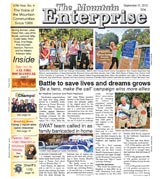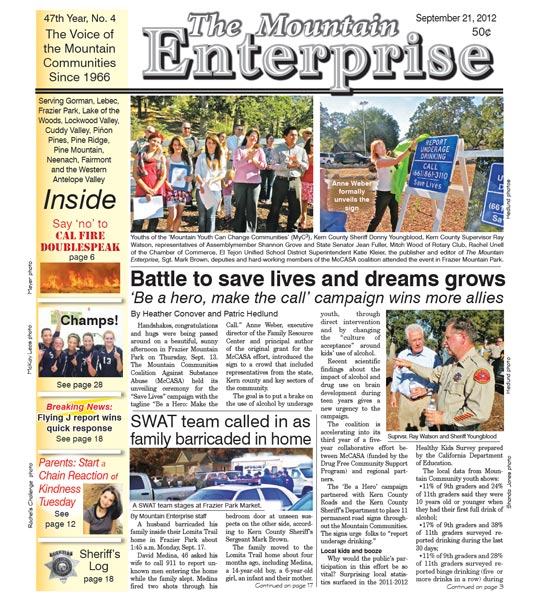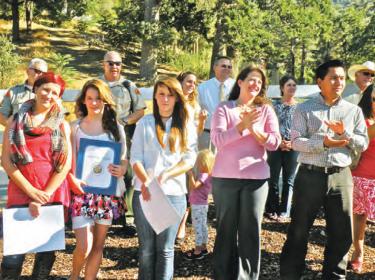
Image 1 of 3
Youths of the ‘Mountain Youth Can Change Communities’ (MyC3), Kern County Sheriff Donny Youngblood, Kern County Supervisor Ray Watson, representatives of Assemblymember Shannon Grove and State Senator Jean Fuller, Mitch Wood of Rotary Club, Rachell Unell of the Chamber of Commerce, El Tejon Unified School District Superintendent Katie Kleier, the publisher and editor of The Mountain Enterprise, Sgt. Mark Brown, deputies and hard-working members of the McCASA coalition attended the event in Frazier Mountain Park.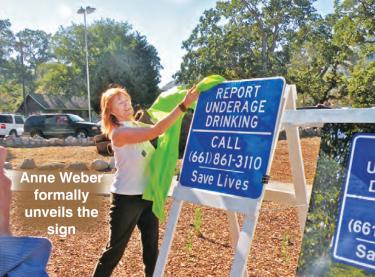
Image 2 of 3
Youths of the ‘Mountain Youth Can Change Communities’ (MyC3), Kern County Sheriff Donny Youngblood, Kern County Supervisor Ray Watson, representatives of Assemblymember Shannon Grove and State Senator Jean Fuller, Mitch Wood of Rotary Club, Rachell Unell of the Chamber of Commerce, El Tejon Unified School District Superintendent Katie Kleier, the publisher and editor of The Mountain Enterprise, Sgt. Mark Brown, deputies and hard-working members of the McCASA coalition attended the event in Frazier Mountain Park.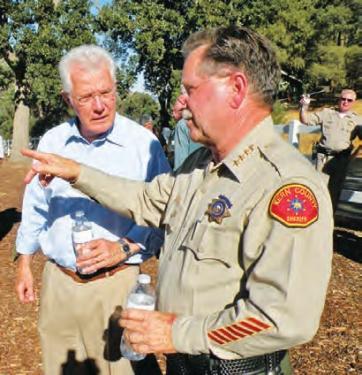
Image 3 of 3
Youths of the ‘Mountain Youth Can Change Communities’ (MyC3), Kern County Sheriff Donny Youngblood, Kern County Supervisor Ray Watson, representatives of Assemblymember Shannon Grove and State Senator Jean Fuller, Mitch Wood of Rotary Club, Rachell Unell of the Chamber of Commerce, El Tejon Unified School District Superintendent Katie Kleier, the publisher and editor of The Mountain Enterprise, Sgt. Mark Brown, deputies and hard-working members of the McCASA coalition attended the event in Frazier Mountain Park.
‘Be a hero, make the call’ campaign wins more allies
By Heather Conover and Patric Hedlund
Handshakes, congratulations and hugs were being passed around on a beautiful, sunny afternoon in Frazier Mountain Park on Thursday, Sept. 13. The Mountain Communities Coalition Against Substance Abuse (McCASA) held its unveiling ceremony for the “Save Lives” campaign with the tagline “Be a Hero: Make the Call.” Anne Weber, executive director of the Family Resource Center and principal author of the original grant for the McCASA effort, introduced the sign to a crowd that included representatives from the state, Kern county and key sectors of the community.
The goal is to put a brake on the use of alcohol by underage youth, through direct intervention and by changing the “culture of acceptance” around kids’ use of alcohol.
Recent scientific findings about the impact of alcohol and drug use on brain development during teen years gives a new urgency to the campaign.
The coalition is accelerating into its third year of a fiveyear collaborative effort between McCASA (funded by the Drug Free Community Support Program) and regional partners.
The ‘Be a Hero’ campaign partnered with Kern County Roads and the Kern County Sheriff’s Department to place 11 permanent road signs throughout the Mountain Communities. The signs urge folks to “report underage drinking.”
Local kids and booze
Why would the public’s participation in this effort be so vital? Surprising local statistics surfaced in the 2011-2012 Healthy Kids Survey prepared by the California Department of Education.
The local data from Mountain Community youth shows:
- 11% of 9th graders and 24% of 11th graders said they were 10 years old or younger when they had their first full drink of alcohol;
- 17% of 9th graders and 38% of 11th graders surveyed reported drinking during the last 30 days;
- 11% of 9th graders and 28% of 11th graders surveyed reported binge drinking (five or more drinks in a row) during the last 30 days.
- About half of 9th and 11th graders surveyed think there is “very little or no harm” in using alcohol frequently.
- Twice as many 9th grade girls than 9th grade boys reported that they had been “very drunk or sick after drinking alcohol” during their lifetime.
Your teenager’s brain
Studies show that the younger a child is when they begin to drink, the more likely they are to become addicted. It can happen in just a few short weeks. Basic structures in the teenage brain are still developing, a process that continues until about 24 years of age.
McCASA is asking the public to help to save lives—and to preserve the ability for children to fulfill their dreams by preventing problems before they start.
National studies show:
- Alcohol use that begins early increases rapidly with age.
- Although the peak period of first use of alcohol is 7th to 10th grade, 10% of 9- to 10-year-olds have already started drinking;
- More than 20% of underage drinkers begin before they are 13 years old.
- Those who begin drinking alcohol before the age of 15 are 6.6 times more likely than those who start at age 21 and older to develop alcohol problems.
- Alcohol use by girls is up. Adolescent females now exhibit rates of drinking, binge drinking and getting drunk similar to rates for adolescent males.
Certain consequences of alcohol use (e.g., unintended pregnancy, sexually transmitted diseases, and interpersonal violence) may be expected to increase as a result.
National statistics are clear
National statistics show what we are seeking to prevent here. During 2009, underage alcohol use contributed to an estimated:
- 1,506 traffic fatalities and 36,963 nonfatal traffic injuries; 1,844 homicides;
- 949,400 crimes such as rape, assault and robbery;
- 1,811,300 property crimes, including burglary, larceny and car theft;
- 28,161 teen pregnancies and 937,972 teens having risky sex.
- Underage drinking cost U.S. citizens an estimated $62 billion in 2010 for related medical care, work loss and associated pain and suffering.
- A little more than 1 million youth initiate alcohol use each year.
By calling the county sheriff’s dispatch number (661) 861-3110, residents can report adults providing alcohol to those under 21 and parties with underage drinkers.
Those who report do not need to give their names.
This is part of the September 21, 2012 online edition of The Mountain Enterprise.
Have an opinion on this matter? We'd like to hear from you.

